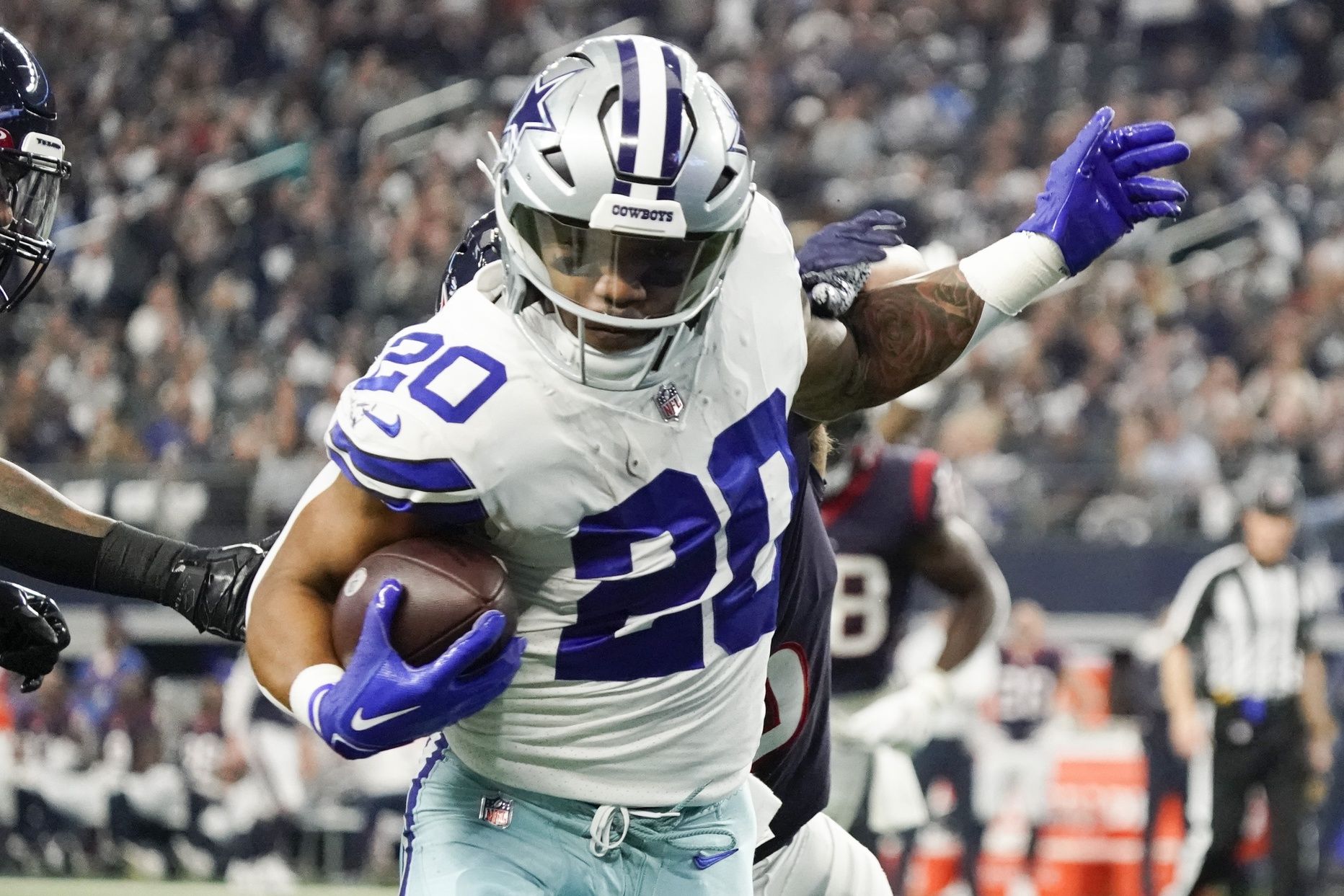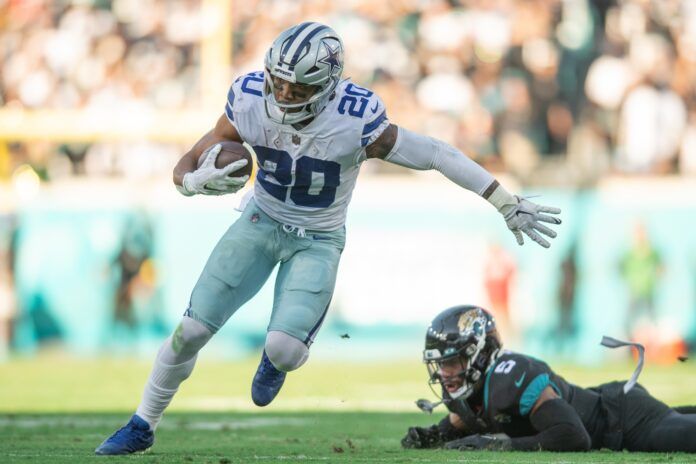The Dallas Cowboys cut Ezekiel Elliott and have planned for Tony Pollard to be their primary running back. While they attempted to secure an extension for Pollard, the two sides couldn’t come to much of an agreement and ended up franchise-tagging the running back. Instead of holding out, Pollard signed the tender with the hopes of securing a long-term deal.
The fallout from the Cowboys’ decision impacts the rest of the NFL and has put another recognizable name at running back on the June free agency market. It also means that Pollard has free rein to prove what many in the fantasy community have argued for years: He deserves a shot at having a full workload at running back.
Tony Pollard’s Contract Details
The Cowboys tendered Pollard with the non-exclusive franchise tag, meaning that other teams had the opportunity to negotiate with Pollard and provide him with an offer sheet. If he signed that offer sheet, the Cowboys would have the ability to match that offer and retain him.
If the Cowboys did not sign that hypothetical offer, then the other team would have to send two first-round picks to Dallas for the right to sign Pollard.
None of that happened, and Pollard instead signed the non-exclusive franchise tender. That meant a one-year deal worth $10.09 million, fully guaranteed. It is likely that Pollard will sign a longer deal with the Cowboys before the contract expires at the beginning of the league year in March of 2024.
Had the Cowboys offered the exclusive franchise tender, no other teams would be allowed to negotiate with Pollard, and the Cowboys would not have had the opportunity to receive multiple first-round picks back.
The exclusive tag is offered very rarely and generally is only given to quarterbacks because very few players are worth two first-round picks, and those that are generally don’t make it to the franchise tag stage of negotiations.
Had they offered the exclusive tag, however, Pollard likely would have made around $13.5 million for the year because the exclusive tag is calculated off of the post-April average of the top-five salaries at the position.
The non-exclusive tag does not account for contracts from that year’s free agency, and so it is generally lower.
Players Impacted by the Tony Pollard Deal
While few players were impacted by the decision in isolation to franchise tag Pollard, the entire decision process around releasing Elliott to focus on Pollard has a number of effects. Of course, Elliott himself is impacted, and he enters a scant free agency market.
His entry into the free agency market impacts other backs who hit free agency, a list that includes Dalvin Cook, Leonard Fournette, and Kareem Hunt.
It also has an impact on Dak Prescott. While the running game typically does not change that much from year to year — and could even improve under Pollard — the bigger issue might be that Elliott is more well-regarded as a pass protector.
Last year, Pollard ended up with a higher PFF pass-blocking grade than Eliott in the one year Pollard was given a real primary workload. Some of that is assignment — Elliott was trusted with more difficult pass-blocking tasks — and some of that is variance. Running backs simply don’t have that many pass-blocking snaps from year to year.
It is notable that Pollard had much lower pass-blocking grades in each of the previous years compared to Elliott. If he is a downgrade, that might have a bigger impact on the passing game than the receiving capabilities of either or their impact on the running game.
If not, then Prescott’s prospects improve, especially with the added bonus that Pollard seems to be deadlier in the passing game.
Moving on from Elliott likely also gave the Cowboys the impetus to draft Deuce Vaughn. Though Vaughn is primarily considered a scatback rather than anyone who can seriously take on a big role in the offense, the movement of Pollard from a passing-down back to a full-time runner meant there was an opening for that kind of player.
Elliott was due to take up $16 million in cap space. Cutting him with the post-June 1 designation freed up just over $10 million in cap space for 2023. The team still has $20 million available in cap space, so they have some more moves to make to meaningfully put up against their allocation for 2023, but that kind of space did allow them to trade for CB Stephon Gilmore and WR Brandin Cooks. Together, they take up nearly $17 million in 2023 cap space.
Winners and Losers of the Tony Pollard Deal

Typically, players do not walk away from franchise tags as winners. Josh Jacobs and Saquon Barkley recognize this and might hold out into training camp. Most players resist the franchise tag because it offers very little long-term security, which is a particular concern at running back.
But Pollard may not have been able to secure a great long-term deal on the open market without a history of production. On the other hand, wear and tear is one of the biggest concerns teams have with running backs.
Elliott entered negotiations for his extension with 1,413 attempts and 241 receptions for a total of 1,654 touches, while Pollard has had 510 total carries and 121 receptions for 631 total touches.
Pollard might have been able to use that to his favor. And certainly, the Cowboys seemed poised to extend him earlier in the offseason, so having those negotiations break down might seem like a loss. That said, a guaranteed $10 million isn’t bad.
Only Miles Sanders earned more guaranteed money in this season’s free agency cycle with a four-year deal worth $25 million that guaranteed $13 million. But his average is much lower, at $6.35 million.
Pollard may make more over a two-year span than Sanders does. No running back in the 2022 free agency cycle earned more guaranteed, though James Conner did sign a $13.5 million extension that year.
All of that is to say that Pollard might actually come away a winner despite no long-term security. At the worst, it’s a wash. The Cowboys are a winner. They get an evaluation year without a long-term commitment while still having the room to round out the roster with talents like Cooks and Gilmore.
Pollard is likely to perform pretty well for the position, assuming the offensive line holds up, and so they get the kind of production that they need — even if they see a drop-off in pass protection.
Cook, Hunt, and Fournette turn out to be slight losers now that there’s a more crowded market. And Elliott, of course, loses out on not having his contract.
The number of winners and losers in this transaction is pretty low compared to other interactions, given how internal the process was — the Cowboys cut one player and offered another player already on their roster a deal. We’ll see if new winners or losers emerge as the rest of the running back market shakes out approaching the beginning of the 2023 season.

